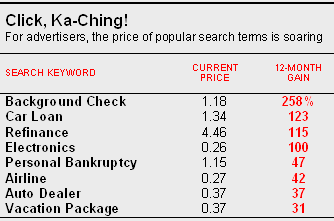Sourced from Business Week
It’s costing more and more to link Net ads to popular search items
Even Google’s biggest boosters expressed surprise at the results. On 1 Feb, the search giant reported $400 million in net earnings for fiscal’04 – a whopping 278% gain – on revenue of $3.2 billion. What accounted for the outsize profits? The high prices Google charges for search keywords, for one. Industrywide, they were up an average of 43.7% last year, according to search marketing firm iProspect.com Inc. And the most sought-after words have become far more dear: “background check” rose 258% in a year. On the day of the earnings announcement, Google CEO Eric E Schmidt told analysts: “there does not seem to be price resistance” from advertisers.
Still, with keyword prices soaring businesses from eBay Inc. to Espresso-Zone.com are rethinking how they use this powerful advertising medium. “It’s incumbent upon us.to figure out how to moderate these quite significant increases in the media costs,” eBay Chief Executive Meg Whitman declared in January following disappointing fourth-quarter results, when rising search marketing costs helped pinch profit margins.
To ensure they get the best bang for their search-advertising buck, eBay and others are doing everything from using different search keywords to redesigning their Web sites. The goal: getting folks who click on the search ads to actually buy something. “Search advertising takes a significant amount of testing, work, and knowledge,” says George Collins, CEO of Espresso-Zone.com, a seller of coffee items in Ashtabula, Ohio. “Otherwise you’re just wasting money.”
The approach to purchasing key-words is changing fast. Companies bid to place their ads along side keywords relevant to their products. A travel agent, say, might bid on “Caribbean cruise” and “airline tickets.” But many advertisers have found such generic keywords to be pricey and less likely to cover the ad cost. Instead, they are bidding on a larger array of more specific keywords: a telecom company might choose “wireless plan” rather than “cell phone” in an effort to lure the most interested buyers. In the past year the average advertiser’s roster of keywords grew by 50%, according to Efficient Frontier Inc., a Mountain View (Calif.) company that manages $100 million in keyword purchases for its clients.
At the same time, online sellers are looking for ways to capture customers after the search ad has directed them to their Web site. There’s plenty of room for improvement. Commerce sites typically convert 2.4% of visitors into customers, according to a study by retailer association Shop.org. The proliferation of broadband should help lift that number. According to e-tailers, broadband users are as much as twice as likely to become paying customers than those using dial-up modems, which slow shopping.

Snappier Presentation
E-tailers also are researching how visitors navigate their sites and are working to better convert them into long-term customers. One way: customizing the e-tailer’s “landing page” – where the searcher is first directed – to a specific keyword. That makes it easier for a customer to get the info she wants and more likely that she will buy.
One company especially adept at converting search ads into customers is Shopping.com. Thanks to its improved presentation of information on prices, availability, and the like on a wide range of products, the conversion-shopping site sites it raised rates on those products by more than a third. That means each search visitor became one-third more valuable, making it easier for Shopping.com to afford the rising cost of keyword. And that, of course, is great news for Google.
